Blog
Malaysia Service Tax rise to 8% March 2024
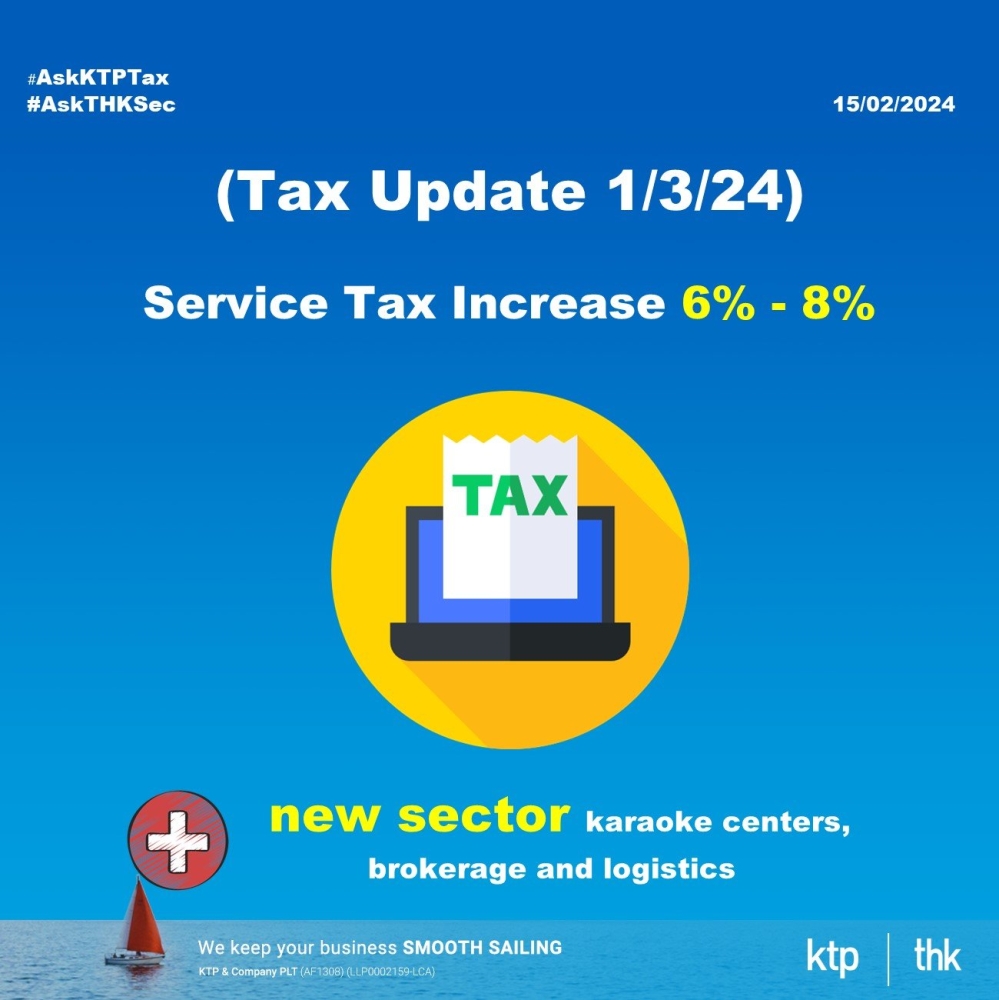
(Tax Update) What is the new SST rate in Malaysia 1 March 2024?
In this blog, we discuss the service tax rate will increase from 6% to 8% on all taxable services with effect from 1 March 2024, except for F&B, telecommunication services, vehicle parking space services and logistic services.
The scope of service tax will also be widened to include karaoke centre services, delivery services, brokerage and underwriting services, as well as logistics services, effective 1 March 2024.
Key Summary
Service Tax Rate Increase
-
Starting from 1 March 2024, the service tax rate will go up to 8%.
-
Some services like food, beverages, telecom, parking, and logistics will still be taxed at 6%.
-
Credit card fees will stay at RM25 per card per year.
-
Other services like accommodation, clubs, and professional services will be taxed at 8%.
Transition Rules for the Tax Increase:
-
Services provided before 1 March 2024, will be taxed at 6%, but services after that date will be taxed at 8%.
-
If a service spans 1 March 2024, part of it will be taxed at 6% and the rest at 8%.
-
Payments made before 1 March 2024, for services after that date will be taxed at 6% if provided within six months, and 8% if provided after six months.
-
Special rules will apply to businesses offering services taxed at different rates.
Expansion of Taxable Services:
-
New services like karaoke centers, brokerage, and logistics will be taxed.
-
Logistics services involve managing the movement and storage of goods and information efficiently.
-
Some services like food delivery and transshipment won't be taxed.
-
Businesses providing logistics services to other businesses will be exempt from tax.
Overall, these changes could affect how much tax businesses and consumers pay for certain services in Malaysia.
Visit Us
-
Wisma KTP, 53 Jalan Molek 1/8, Taman Molek, 81100 Johor Bahru
-
Wisma THK, 41, Jalan Molek 1/8, Taman Molek, 81100 Johor Bahru
KTP (Audit, Tax, Advisory)
An approved audit firm and licensed tax firm operating under the KTP group based in Johor Bahru providing audit, tax planning, advisory and compliance services to clients
-
Website www.ktp.com.my
-
Instagram https://bit.ly/3Rko5kN
-
Linkedin https://bit.ly/3sapf4l
-
Telegram http://bit.ly/3ptmlpn
THK (Secretarial, Bookkeeping, Payroll, Advisory)
A licensed secretarial firm in Johor Bahru providing fast reliable incorporation, secretarial services, corporate compliance services, outsourcing bookkeeping, and payroll services to clients
-
Website www.thks.com.my
-
Facebook https://bit.ly/3nQ98rs
KTP Lifestyle
An internal community for our colleagues on work and leisure.
-
Tiktok http://bit.ly/3u9LR6Q
-
Youtube http://bit.ly/3ppmjyE
-
Facebook http://bit.ly/3ateoMz
-
Instagram https://bit.ly/3jZpKLo
KTP Career
An external job community on vacancies in Johor Bahru for interns, graduates & experienced candidates.
-
Instagram https://bit.ly/3u2PxHg
-
Facebook http://bit.ly/3rPxz9o
What Directors Should Do After Incorporation
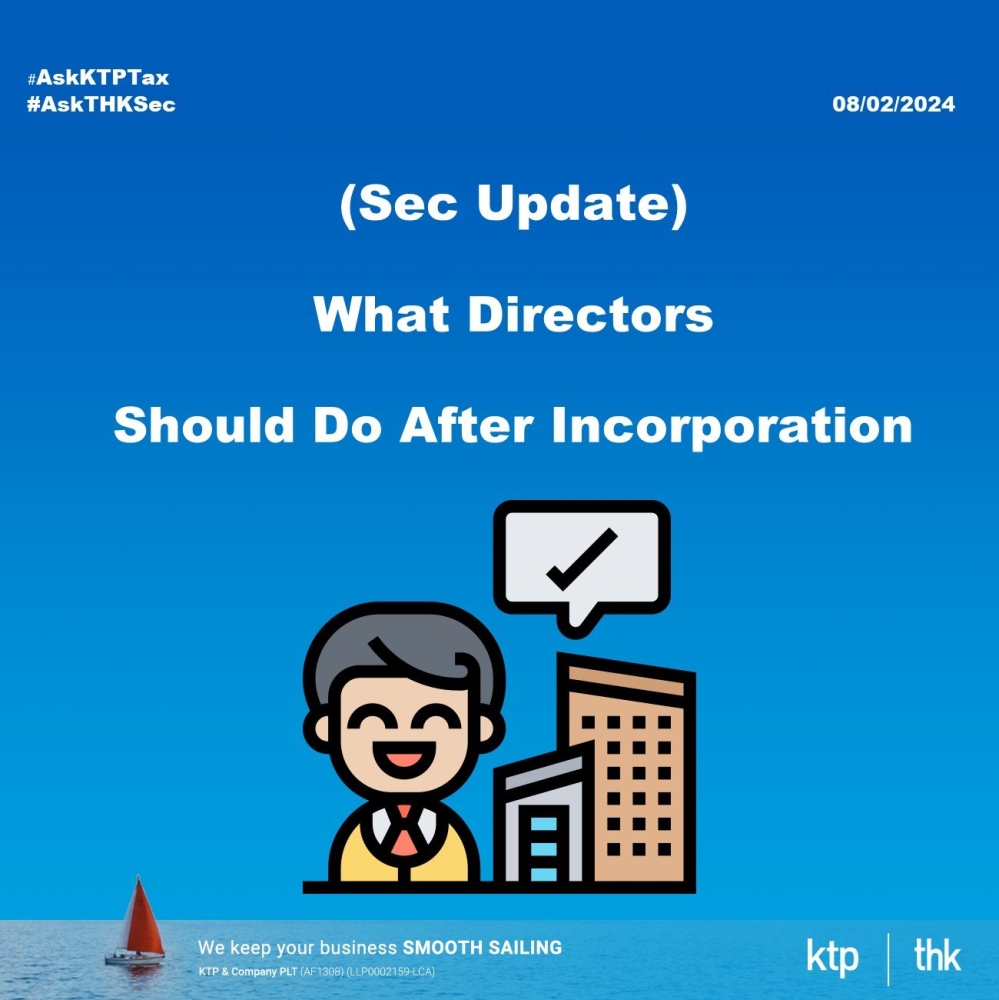
(Sec update) What Directors Should Do After Incorporation
Embarking on the corporate journey in Malaysia involves more than just the initial setup. Directors play a crucial role in steering the company through ongoing responsibilities.
This article outlines key post-incorporation tasks, including filing Annual Returns, submitting Financial Statements, and managing Tax Returns to LHDN. Adhering to these deadlines is essential to avoid penalties and ensure regulatory compliance.
Join us as we explore the vital steps directors must take after incorporation for sustained success in the Malaysian business landscape.
Annual Return
According to the Companies Act 2016 in Malaysia, the Annual Return is a statutory document that companies need to file with the Companies Commission of Malaysia (SSM). This document allows companies to update and confirm their registered information with the SSM, including details about shareholders, directors, registered office address, share capital, and financial position.
Typically, the Company Secretary will prepare the Annual Return for the Director's review, approved via the Directors' Written Resolution. Once approved, the Company Secretary will submit the Annual Return (Section 68) via MBRS.
Companies are required to file the Annual Return within 30 days from the anniversary of their incorporation date.
Financial Statement
The board of directors must ensure that the company's financial statement is submitted within the specified deadline to SSM. The board oversees the financial reporting process, ensuring that management fulfills its responsibilities in preparing accurate and reliable financial statements. After the management account is ready, an approved auditor audits the report to provide assurance in accordance with relevant auditing standards.
The auditor expresses an opinion on whether the financial statements present a true and fair view of the company's financial position, results of operations, and cash flows. This opinion is crucial for stakeholders such as bankers, shareholders, employees, and creditors.
Once the audited report is ready, the director circulates it within 6 months from the financial year-end to shareholders by conducting a meeting. After circulation, the auditor passes the audited report to the secretary to arrange for submission to SSM within 30 days from the circulation date.
Tax Return to the Inland Revenue Board of Malaysia (LHDN):
Form E
Employers must submit Form E annually to report employees' income details, including their name, identification number, employment income, and tax deductions. Employers are responsible for deducting the appropriate amount of income tax from employees' salaries and remitting it to the tax authorities.
The deadline for submitting Form E is typically in March of the following year, done electronically through the e-filing system provided by the Inland Revenue Board.
CP204
Used by companies to declare estimated chargeable income and determine installment payments for the upcoming year, CP204 is part of the corporate tax filing process in Malaysia. Companies must submit CP204 within 7 months from the end of their accounting period.
Based on the estimated chargeable income declared, companies must make installment payments through the e-filing system.
Form C
Form C is used by companies to report actual chargeable income, tax adjustments, and other relevant details to the Inland Revenue Board. The deadline for submitting Form C is usually within seven months from the end of the company's financial year. Companies need to provide details of financial transactions, income, expenses, and other relevant financial information. Form C, along with audited financial statements, is typically submitted electronically through the e-filing system.
Conclusion
Late submission of these crucial documents may result in penalties or compounds imposed by SSM or LHDN. Directors must adhere to these deadlines to maintain compliance and avoid legal repercussions.
Engaging these professionals from company secretaries, auditors, accountants, and tax agents not only ensures compliance with regulatory requirements but also provides valuable insights, allowing directors to navigate the intricacies of corporate governance with confidence and precision.
This collaboration ensures precision in meeting regulatory requirements, offering directors the necessary support to steer their businesses toward sustained success.
PS : Authored by Syazwan, our secretary associate in THK, in her personal LinkedIn post
Visit Us
-
Wisma KTP, 53 Jalan Molek 1/8, Taman Molek, 81100 Johor Bahru
-
Wisma THK, 41, Jalan Molek 1/8, Taman Molek, 81100 Johor Bahru
KTP (Audit, Tax, Advisory)
An approved audit firm and licensed tax firm operating under the KTP group based in Johor Bahru providing audit, tax planning, advisory and compliance services to clients
-
Website www.ktp.com.my
-
Instagram https://bit.ly/3Rko5kN
-
Linkedin https://bit.ly/3sapf4l
-
Telegram http://bit.ly/3ptmlpn
THK (Secretarial, Bookkeeping, Payroll, Advisory)
A licensed secretarial firm in Johor Bahru providing fast reliable incorporation, secretarial services, corporate compliance services, outsourcing bookkeeping, and payroll services to clients
-
Website www.thks.com.my
-
Facebook https://bit.ly/3nQ98rs
KTP Lifestyle
An internal community for our colleagues on work and leisure.
-
Tiktok http://bit.ly/3u9LR6Q
-
Youtube http://bit.ly/3ppmjyE
-
Facebook http://bit.ly/3ateoMz
-
Instagram https://bit.ly/3jZpKLo
KTP Career
An external job community on vacancies in Johor Bahru for interns, graduates & experienced candidates.
-
Instagram https://bit.ly/3u2PxHg
-
Facebook http://bit.ly/3rPxz9o
Tax Treatment on Company Trip

(Tax Update) Tax Treatment on Company Trip
In this blog, we discuss the tax treatment for both local and overseas trips provided by a company to its employees. Here's a key takeaway for your understanding.
Company-Sponsored Employee Trips: Understanding Tax Implications
When a company offers its employees the opportunity to embark on trips, whether within their home country or abroad, it's important to consider the tax implications for both the employer and the employee. In this article, we'll delve into the tax treatment of these trips in detail.
1. Tax Treatment for Employer and Employee for Local and Overseas Trips
Let's break down the tax treatment for both local and overseas company-sponsored trips from the perspective of the employer and the employee:
Local Trips:
For Employers: The costs incurred for airfares, meals, and accommodation related to local trips are eligible for a full deduction when calculating the company's taxable income. This is classified as an entertainment expense according to the Addendum to Public Ruling No.1/2003 Tax Treatment on Leave Passage.
For Employees: Local trips do not impact the employee's taxable income, as there is no leave passage cost associated with these journeys.
Overseas Trips:
For Employers: In the case of overseas trips, the cost of airfares (treated as leave passage cost) is not deductible for the employer. However, the costs related to food and accommodation are deductible as entertainment expenses, with the condition that they are restricted to the amount spent on the employee.
For Employees: For the first overseas trip in a calendar year, employees are eligible for an exemption on the leave passage cost (airfares), limited to a maximum value of RM3,000.00. However, for second overseas trips onwards, the cost of airfares (leave passage cost) becomes assessable as employment income.
2. Key Facts
Local Trip: According to the Addendum to Public Ruling No.1/2003 Tax Treatment on Leave Passage, expenses incurred by an employer to facilitate a yearly event within Malaysia involving the employer, employee, and immediate family members fall under the category of entertainment expenses. As such, local company trips are fully deductible in the company's tax computation. From the employee's perspective, these trips do not affect their taxable income, as no leave passage cost is involved.
Overseas Trip: Paragraph 10 of Public Ruling No.1/2003 states that expenditures related to leave passages, whether within or outside Malaysia, are not deductible in the company's tax computation. However, the ruling further elaborates:
-
Only the cost of airfares is treated as leave passage cost and is not allowed for deduction.
-
Other costs, such as food and accommodation, are deductible as entertainment expenses but are limited to the amount spent on the employee.
For employees, paragraph 8(ii) of this public ruling outlines that an exemption, limited to a maximum value of RM3,000, is granted on the leave passage cost (airfares) for one overseas trip outside Malaysia in a calendar year. Subsequently, for the second overseas trip onwards, the cost of airfares becomes assessable as employment income.
Source :
-
Reference Public Ruling No.1/2003 – Tax Treatment of Leave Passage https://phl.hasil.gov.my/pdf/pdfam/PR1_2003.pdf
-
Addendum to Public Ruling No.1/2003 – Tax Treatment of Leave Passage https://phl.hasil.gov.my/pdf/pdfam/PR1_2003_Add1.pdf
-
Income Tax Act 1967 https://phl.hasil.gov.my/pdf/pdfam/Act_53_20190101.pdf
-
Public Ruling No.4/2015 – Entertainment Expense https://phl.hasil.gov.my/pdf/pdfam/PR_4_2015.pdf
PS : Authored by Bryan Kam Shi Zhen and Gan Yong Chun, our audit associates with KTP, in their personal LinkedIn post.
Visit Us
-
Wisma KTP, 53 Jalan Molek 1/8, Taman Molek, 81100 Johor Bahru
-
Wisma THK, 41, Jalan Molek 1/8, Taman Molek, 81100 Johor Bahru
KTP (Audit, Tax, Advisory)
An approved audit firm and licensed tax firm operating under the KTP group based in Johor Bahru providing audit, tax planning, advisory and compliance services to clients
-
Website www.ktp.com.my
-
Instagram https://bit.ly/3Rko5kN
-
Linkedin https://bit.ly/3sapf4l
-
Telegram http://bit.ly/3ptmlpn
THK (Secretarial, Bookkeeping, Payroll, Advisory)
A licensed secretarial firm in Johor Bahru providing fast reliable incorporation, secretarial services, corporate compliance services, outsourcing bookkeeping, and payroll services to clients
-
Website www.thks.com.my
-
Facebook https://bit.ly/3nQ98rs
KTP Lifestyle
An internal community for our colleagues on work and leisure.
-
Tiktok http://bit.ly/3u9LR6Q
-
Youtube http://bit.ly/3ppmjyE
-
Facebook http://bit.ly/3ateoMz
-
Instagram https://bit.ly/3jZpKLo
KTP Career
An external job community on vacancies in Johor Bahru for interns, graduates & experienced candidates.
-
Instagram https://bit.ly/3u2PxHg
-
Facebook http://bit.ly/3rPxz9o
We Are Hiring Now

We Are Hiring Now
Are you curious about the KTP experience?
In this enlightening session conducted in English on the Zoom platform, we invite you to dive deep into the diverse experiences at KTP as shared by our dynamic team members:
1. Ain, an enthusiastic intern.
2. Aiman, a motivated fresh graduate.
3. Fatira, an experienced professional.
They'll be candidly sharing their personal journeys and insights gained during their first six months at KTP.
Don't miss this opportunity to gain insider perspectives and valuable insights into life at KTP!
Watch the full (40 minutes) interview in our YouTube
https://youtu.be/GHEiCH0-3MQ
Send in your full resume to careers@ktp.com.my
Visit Us
-
Wisma KTP, 53 Jalan Molek 1/8, Taman Molek, 81100 Johor Bahru
-
Wisma THK, 41, Jalan Molek 1/8, Taman Molek, 81100 Johor Bahru
KTP (Audit, Tax, Advisory)
An approved audit firm and licensed tax firm operating under the KTP group based in Johor Bahru providing audit, tax planning, advisory and compliance services to clients
-
Website www.ktp.com.my
-
Instagram https://bit.ly/3jZuZuI
-
Linkedin https://bit.ly/3sapf4l
-
Telegram http://bit.ly/3ptmlpn
THK (Secretarial, Bookkeeping, Payroll, Advisory)
A licensed secretarial firm in Johor Bahru providing fast reliable incorporation, secretarial services, corporate compliance services, outsourcing bookkeeping, and payroll services to clients
-
Website www.thks.com.my
-
Facebook https://bit.ly/3nQ98rs
KTP Lifestyle
An internal community for our colleagues on work and leisure.
-
Tiktok http://bit.ly/3u9LR6Q
-
Youtube http://bit.ly/3ppmjyE
-
Facebook http://bit.ly/3ateoMz
-
Instagram https://bit.ly/3jZpKLo
KTP Career
An external job community on vacancies in Johor Bahru for interns, graduates & experienced candidates.
-
Instagram https://bit.ly/3u2PxHg
-
Facebook http://bit.ly/3rPxz9o
Public Ruling 10/2023 Pioneer Status Incentive
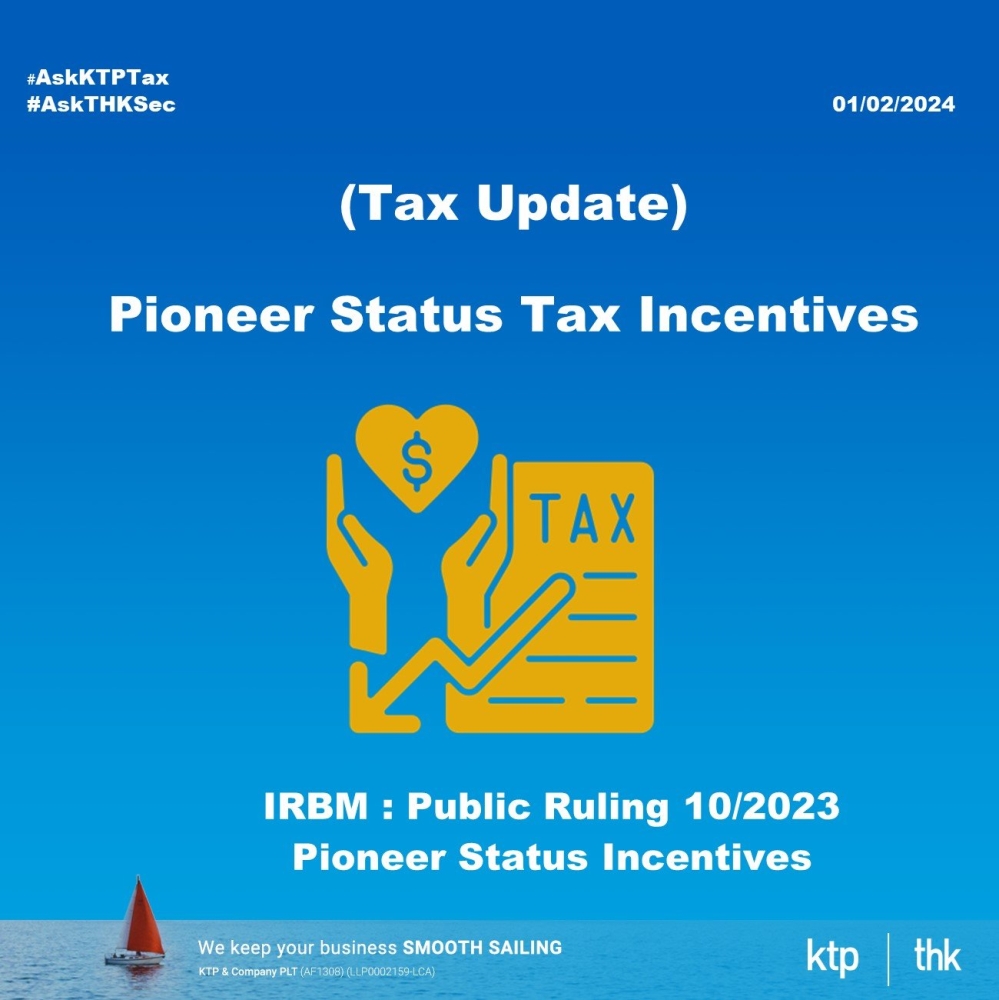
(Tax Update) Unlocking the Benefits of Pioneer Status Tax Incentive
Public Ruling 10/2023 Pioneer Status Incentive
The publication of Public Ruling 10/2023 on the Pioneer Status Incentive by IRBM on December 29, 2023, is particularly relevant. As tax agents, we consistently recommend that our taxpayers and investors consult official publications from MIDA.
This incentive is designed to attract and facilitate investment in key sectors, offering substantial tax benefits to qualifying companies. As an investor, understanding these details is critical for making informed decisions about potential investments in Malaysia
Pioneer Status is, in general, given by way of exemption from tax on 70% of the statutory income for five years and the remaining 30% is taxed at the prevailing tax rate.
For a comprehensive understanding of the Pioneer Status tax incentive, we invite you to explore our case study, available on our KTP website at https://www.ktp.com.my/pioneer-status.
Here's a summary of key points of Public Ruling 10/2023 :
Objective
This incentive aims to explain the pioneer status available to companies engaged in promoted activities or producing promoted products in Malaysia.
Pioneer Status
It's a tax incentive under the Promotion of Investments Act (PIA), providing tax relief on statutory business income for companies in certain sectors.
Qualifying Companies
Pioneer status is granted to companies undertaking promoted activities or producing promoted products. This includes sectors like manufacturing, agriculture, hotels, tourism, etc.
Promoted Activities and Products
These are determined by the Minister of International Trade and Industry, in concurrence with the Minister of Finance, and are updated periodically.
Application Process
Applications for pioneer status are handled by the Malaysian Investment Development Authority (MIDA). Companies can apply for pioneer status for multiple activities or products.
Grant of Pioneer Status
The status is granted based on the fulfillment of certain criteria and is subject to conditions specified in the approval letter.
Pioneer Certificate
Companies must apply for this within 24 months of pioneer status approval. It certifies the company as a pioneer company, identifies the pioneer factory, and states the production day.
Withdrawal and Cancellation
Pioneer status can be withdrawn or canceled if the company fails to comply with terms and conditions.
Tax Relief Period
Typically five years from the production day, during which part or all of the statutory income from the pioneer business is exempt from tax. Extension of Tax Relief Period: Companies can apply for an extension of another five years.
Tax Treatment
The ruling details the tax treatment of pioneer companies, including basis periods, computation of pioneer income, and capital allowances.
Pioneer Company Losses
Statutory income of a pioneer business will be fully or partially exempted, but subject to deductions for losses.
Separate Accounts
Companies must keep separate accounts for the pioneer and any other business activities.
Source :
Public Ruling 10/2023 Pioneer Status Incentive https://www.hasil.gov.my/media/wrqhhbta/pr-10-2023-pioneer-status-incentive.pdf
Visit Us
-
Wisma KTP, 53 Jalan Molek 1/8, Taman Molek, 81100 Johor Bahru
-
Wisma THK, 41, Jalan Molek 1/8, Taman Molek, 81100 Johor Bahru
KTP (Audit, Tax, Advisory)
An approved audit firm and licensed tax firm operating under the KTP group based in Johor Bahru providing audit, tax planning, advisory and compliance services to clients
-
Website www.ktp.com.my
-
Instagram https://bit.ly/3Rko5kN
-
Linkedin https://bit.ly/3sapf4l
-
Telegram http://bit.ly/3ptmlpn
THK (Secretarial, Bookkeeping, Payroll, Advisory)
A licensed secretarial firm in Johor Bahru providing fast reliable incorporation, secretarial services, corporate compliance services, outsourcing bookkeeping, and payroll services to clients
-
Website www.thks.com.my
-
Facebook https://bit.ly/3nQ98rs
KTP Lifestyle
An internal community for our colleagues on work and leisure.
-
Tiktok http://bit.ly/3u9LR6Q
-
Youtube http://bit.ly/3ppmjyE
-
Facebook http://bit.ly/3ateoMz
-
Instagram https://bit.ly/3jZpKLo
KTP Career
An external job community on vacancies in Johor Bahru for interns, graduates & experienced candidates.
-
Instagram https://bit.ly/3u2PxHg
-
Facebook http://bit.ly/3rPxz9o
What is the capital gains tax in 2024 Malaysia?

(Tax Update) Capital Gain Tax: Filing Deadline
Introduction
Effective from 1st January 2024, company, limited liability partnership, trust body, and co-operative society which receives gains or profits from the disposal of capital assets consisting of:
-
share of a company incorporated in Malaysia not listed on the stock exchange; or
-
share of a controlled company incorporated outside Malaysia that owns real property situated in Malaysia or shares of another controlled company or both,
are subject to Capital Gains Tax (CGT) under the Income Tax Act 1967.
Exemption Period
Any disposal for the period of 1st January 2024 to 29th February 2024 is exempted from Capital Gains Tax under The Income Tax (Exemption) (No. 7) Order 2023.
The taxpayer is not required to submit a tax return for the disposal of that capital asset within the above period.
Responsibility of Taxpayers on CGT
Chargeable persons according to the provisions of section 66 to section 75B are responsible for submitting CGT tax returns.
The appointed representatives are responsible for submitting CGT tax returns on behalf of the taxpayer. The representatives are assessable and chargeable to tax and the payment of tax charged.
A licensed tax agent under section 153 of the ITA 1967 can be appointed to submit CGT tax returns.
CGT Filing and Tax Payment Deadline
Taxpayers are to submit CGT tax returns and make tax payments within sixty days of the date of disposal.
For assessments raised under sections 91, 96A, and subsections 90(3), 101(2) of ITA 1967, the tax / balance of tax shall be paid within 30 days from the date of assessment. Nevertheless, a grace period of 7 days is given
Tax Return
Taxpayers are required to submit tax returns through e-Filing (e-CKM Form). Kindly visit MyTax portal at https://mytax.hasil.gov.my to access e-CKM Form from 1st March 2024.
Taxpayers shall have a Tax Identification Number (TIN) and Digital Certificate to access e-CKM.
Past Blog on CGT
Read our past blog on CGT
-
Capital gain tax https://www.ktp.com.my/blog/malaysias-budget-2024-capital-gain-tax-part1/23nov23
-
Exemption Period on CGT https://www.ktp.com.my/blog/capital-gain-tax-malaysia-2024/04jan24
-
Real property company under CGT https://www.ktp.com.my/blog/real-property-company-under-capital-gain-tax/10jan24
Visit Us
-
Wisma KTP, 53 Jalan Molek 1/8, Taman Molek, 81100 Johor Bahru
-
Wisma THK, 41, Jalan Molek 1/8, Taman Molek, 81100 Johor Bahru
KTP (Audit, Tax, Advisory)
An approved audit firm and licensed tax firm operating under the KTP group based in Johor Bahru providing audit, tax planning, advisory and compliance services to clients
-
Website www.ktp.com.my
-
Instagram https://bit.ly/3Rko5kN
-
Linkedin https://bit.ly/3sapf4l
-
Telegram http://bit.ly/3ptmlpn
THK (Secretarial, Bookkeeping, Payroll, Advisory)
A licensed secretarial firm in Johor Bahru providing fast reliable incorporation, secretarial services, corporate compliance services, outsourcing bookkeeping, and payroll services to clients
-
Website www.thks.com.my
-
Facebook https://bit.ly/3nQ98rs
KTP Lifestyle
An internal community for our colleagues on work and leisure.
-
Tiktok http://bit.ly/3u9LR6Q
-
Youtube http://bit.ly/3ppmjyE
-
Facebook http://bit.ly/3ateoMz
-
Instagram https://bit.ly/3jZpKLo
KTP Career
An external job community on vacancies in Johor Bahru for interns, graduates & experienced candidates.
-
Instagram https://bit.ly/3u2PxHg
-
Facebook http://bit.ly/3rPxz9o
What Is The Surcharge For Transfer Pricing (TP) Malaysia?
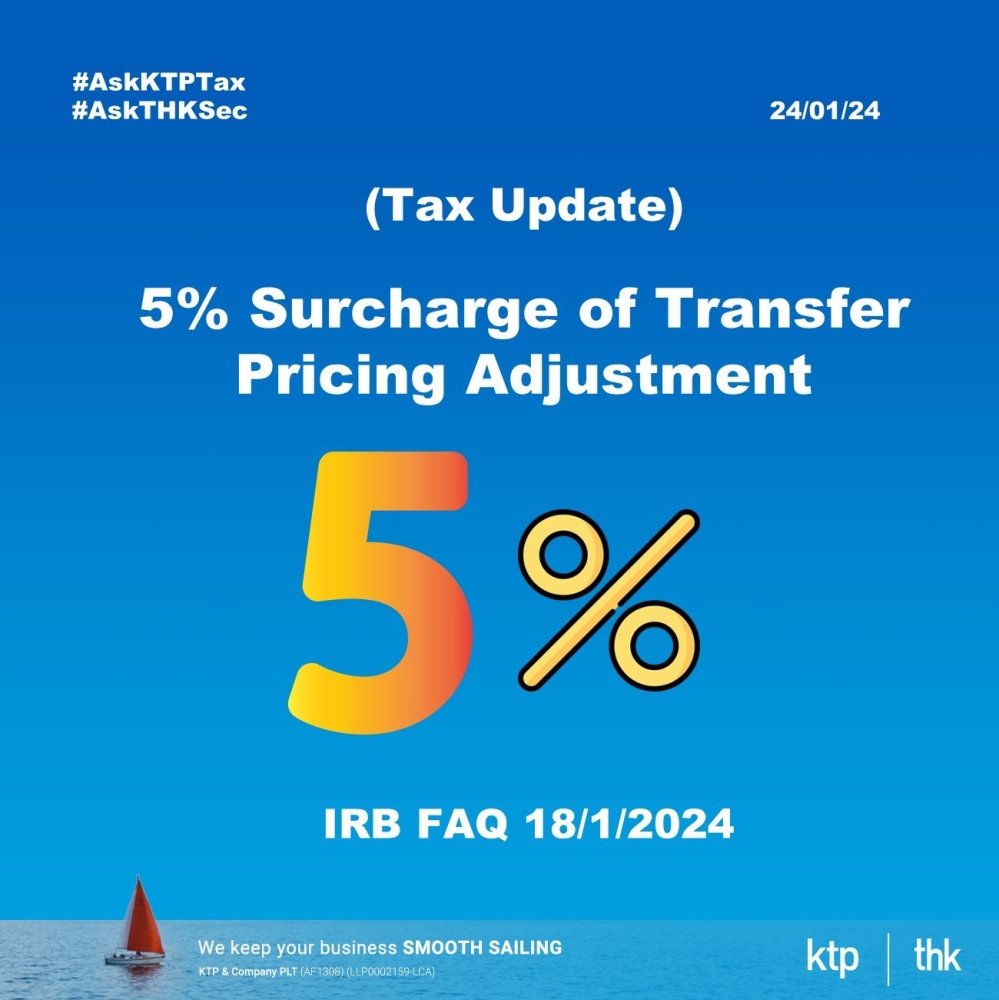
(Tax update) What Is The Surcharge For Transfer Pricing (TP) Malaysia?
Surcharge 5%
With effect from 1 January 2021, the IRBM may impose a surcharge of up to 5% on any increase in income or reduction of any deduction / loss arising from these adjustments.
A surcharge is imposed on a Transfer Pricing (TP) adjustment made under Section 140A of the Income Tax Act 1967 (ITA) which results in an increase in income or a reduction of any deduction or loss. When any taxpayer does not comply with the arm’s length principles, a surcharge will be imposed on that adjustment regardless of whether the taxpayer is in a loss position or a tax exempt company.
The imposition of surcharge of up to 5% on any transfer pricing adjustment under Section 140A(3C) was released on 18 January 2024 in Frequently Asked Question (FAQ) in IRBM website.
Key Takeaways of the FAQ
Surcharge on incorrect transfer prices
Starting from January 1, 2021, the IRB can impose a surcharge of up to 5% on any transfer pricing adjustments. This applies even if the adjustment doesn’t result in additional tax payable, affecting loss-making or tax-exempt companies.
Application of surcharge
The surcharge applies to tax audits initiated from January 1, 2021, onwards, regardless of the financial year being audited. Only a surcharge will be imposed in cases where transfer pricing adjustments result in additional income, not a penalty for submitting an incorrect return.
Non-appealability of surcharge
The surcharge, which is not a tax, cannot be appealed through legal processes but only to the Director General of Inland Revenue on a case-by-case basis.
Penalties for not furnishing documentation
Failure to provide contemporaneous transfer pricing documentation within 14 days of request can result in penalties ranging from RM20,000 to RM100,000, and potentially a prison term of up to six months.
Mutually Exclusive with Section 113 (2)
The FAQ states that the surcharge is mutually exclusive with the penalty under Section 113(2).
What is the new TP rule in Malaysia?
The documentation must be prepared before the due date for submitting income tax returns and must include the date of completion.
The IRB scrutinizes various aspects like sales/purchase margins, profitability, intragroup services, and intragroup financing. Lack of benchmarks, consistent losses, and insufficient supporting documents are some of the red flags.
Even companies enjoying tax holidays or incurring losses must adhere to transfer pricing rules, as any adjustments by the IRB will attract a surcharge.
Taxpayers are advised to scrutinize their related company transactions to ensure compliance with the arm's length principle to avoid penalties and fines.
Failure to provide contemporaneous transfer pricing documentation within 14 days of request can result in penalties ranging from RM20,000 to RM100,000, and potentially a prison term of up to six months.
The transfer pricing scene in Malaysia is rapidly evolving, and taxpayers are advised to stay informed and compliant to avoid severe penalties and fines.
Sources
IRBM : FAQ on TP 18/1/2024
https://www.hasil.gov.my/media/w0ag5bsp/faq-on-matters-arising-from-subsection-140a-3c-ita-1967.pdf
Visit Us
-
Wisma KTP, 53 Jalan Molek 1/8, Taman Molek, 81100 Johor Bahru
-
Wisma THK, 41, Jalan Molek 1/8, Taman Molek, 81100 Johor Bahru
KTP (Audit, Tax, Advisory)
An approved audit firm and licensed tax firm operating under the KTP group based in Johor Bahru providing audit, tax planning, advisory and compliance services to clients
-
Website www.ktp.com.my
-
Instagram https://bit.ly/3Rko5kN
-
Linkedin https://bit.ly/3sapf4l
-
Telegram http://bit.ly/3ptmlpn
THK (Secretarial, Bookkeeping, Payroll, Advisory)
A licensed secretarial firm in Johor Bahru providing fast reliable incorporation, secretarial services, corporate compliance services, outsourcing bookkeeping, and payroll services to clients
-
Website www.thks.com.my
-
Facebook https://bit.ly/3nQ98rs
KTP Lifestyle
An internal community for our colleagues on work and leisure.
-
Tiktok http://bit.ly/3u9LR6Q
-
Youtube http://bit.ly/3ppmjyE
-
Facebook http://bit.ly/3ateoMz
-
Instagram https://bit.ly/3jZpKLo
KTP Career
An external job community on vacancies in Johor Bahru for interns, graduates & experienced candidates.
-
Instagram https://bit.ly/3u2PxHg
-
Facebook http://bit.ly/3rPxz9o
What are the most important clauses in a shareholder agreement?

(Sec update) Top 5 Crucial Clauses in Shareholders' Agreement
One or more business partners incorporating a company may seem like a straightforward process that does not require any agreement. However, some of the shareholders may want to consider entering a shareholder’s agreement, especially if you are a minority shareholder in the company.
Although the Companies Act 2016 does provide some protection for shareholders, such as oppression of minority shareholders. When shareholders sign a Shareholders Agreement (SHA), the court typically gives it priority, as the SHA reflects the final intent of the parties' relationship nature.
If “Without” an SHA, it may be more challenging to find legal grounds to make a claim, as the protections provided by the company's constitution may be insufficient.
Leverage our 25 years of unparalleled company secretarial experience to uncover the five (5) indispensable clauses that can make or break your Shareholders' Agreement. Don't embark on your business journey without this invaluable knowledge
Top 5 Clauses in Shareholders’ Agreement
We have pointed out the following five common clauses in a Shareholders' Agreement (SHA) that may help to protect your rights as a minority shareholder:
1. Reserved Matters
In the SHA may state the reserved matters that require unanimous voting by the company. This clause is crucial for minority shareholders, providing protection against the majority shareholders' rights (who are likely to win with a majority vote at company meetings).
Examples of reserved matters such as include changes in the company's business, an increase in the company's share capital (which dilutes everyone's ownership), exercising borrowing powers (such as obtaining substantial loans from banks), or creating security interests (such as registering a charge on company assets).
2. Shareholder Obligations
Each Shareholder's obligations in the company can be clearly defined in the SHA. Such as a common clause states, ''Shareholders shall act in the best interests of the company.'' If each shareholder provides different contributions, this clause helps specify individual obligations.
For example, Mr. A is obligated to invest funds in the company; Mr. B has to contribute his/her expertise in certain areas, maybe in terms of knowledge or skills; and Mr. C, with decades of management experience, oversees and implements various company projects.
3. Directors
Companies usually have an odd number of directors to prevent deadlock situations. For some situations, the majority shareholders may appoint directors count tends to favor them in maintaining control at the executive level.
However, minority shareholders should insist on the right to appoint at least one director by adding this clause in the SHA, ensuring representation on the board allows easy oversight of company operations and protects minority shareholder interests.
4. Equity Transfer
To ensure clear provisions when another shareholder wishes to exit the company, this is preventing potential co-ownership with your competitor. It's crucial to explicitly outline (Exit Conditions) such details in the shareholders' agreement.
Another key provision is the purchase price for the existing shareholder's shares. The Shareholders may state the selling price in the SHA as agreed upon among the Shareholders for whoever exits the company in a certain time. Unless the exiting shareholder agrees to give up shares at the initial investment price (often impractical), some valuation mechanism may be necessary. However, valuing a company can be costly.
Specific clauses like pre-emptive rights, tag-along rights, drag-along rights, and drag-with rights exist and may be included in the SHA but may not be necessary, especially for small to medium-sized enterprises.
5. Dispute Situation
Dispute resolution clauses provide shareholders with options to resolve conflicts among them. For instance, a shareholders' agreement may include an arbitration clause, meaning any disputes must be resolved through arbitration rather than litigation in court.
However, as a minority shareholder, caution should be exercised before agreeing to an arbitration clause unless you fully understand its implications.
In conclusion, shareholders' agreements are common and can effectively protect the interests of all involved shareholders, especially minorities. Even if a company did not initially sign such an agreement, there's nothing stopping shareholders from subsequently doing so.
PS : Authored by Hui Ting, our secretary associates in THK, in her personal LinkedIn post
Visit Us
-
Wisma KTP, 53 Jalan Molek 1/8, Taman Molek, 81100 Johor Bahru
-
Wisma THK, 41, Jalan Molek 1/8, Taman Molek, 81100 Johor Bahru
KTP (Audit, Tax, Advisory)
An approved audit firm and licensed tax firm operating under the KTP group based in Johor Bahru providing audit, tax planning, advisory and compliance services to clients
-
Website www.ktp.com.my
-
Instagram https://bit.ly/3Rko5kN
-
Linkedin https://bit.ly/3sapf4l
-
Telegram http://bit.ly/3ptmlpn
THK (Secretarial, Bookkeeping, Payroll, Advisory)
A licensed secretarial firm in Johor Bahru providing fast reliable incorporation, secretarial services, corporate compliance services, outsourcing bookkeeping, and payroll services to clients
-
Website www.thks.com.my
-
Facebook https://bit.ly/3nQ98rs
KTP Lifestyle
An internal community for our colleagues on work and leisure.
-
Tiktok http://bit.ly/3u9LR6Q
-
Youtube http://bit.ly/3ppmjyE
-
Facebook http://bit.ly/3ateoMz
-
Instagram https://bit.ly/3jZpKLo
KTP Career
An external job community on vacancies in Johor Bahru for interns, graduates & experienced candidates.
-
Instagram https://bit.ly/3u2PxHg
-
Facebook http://bit.ly/3rPxz9o
enterprise vs sdn bhd
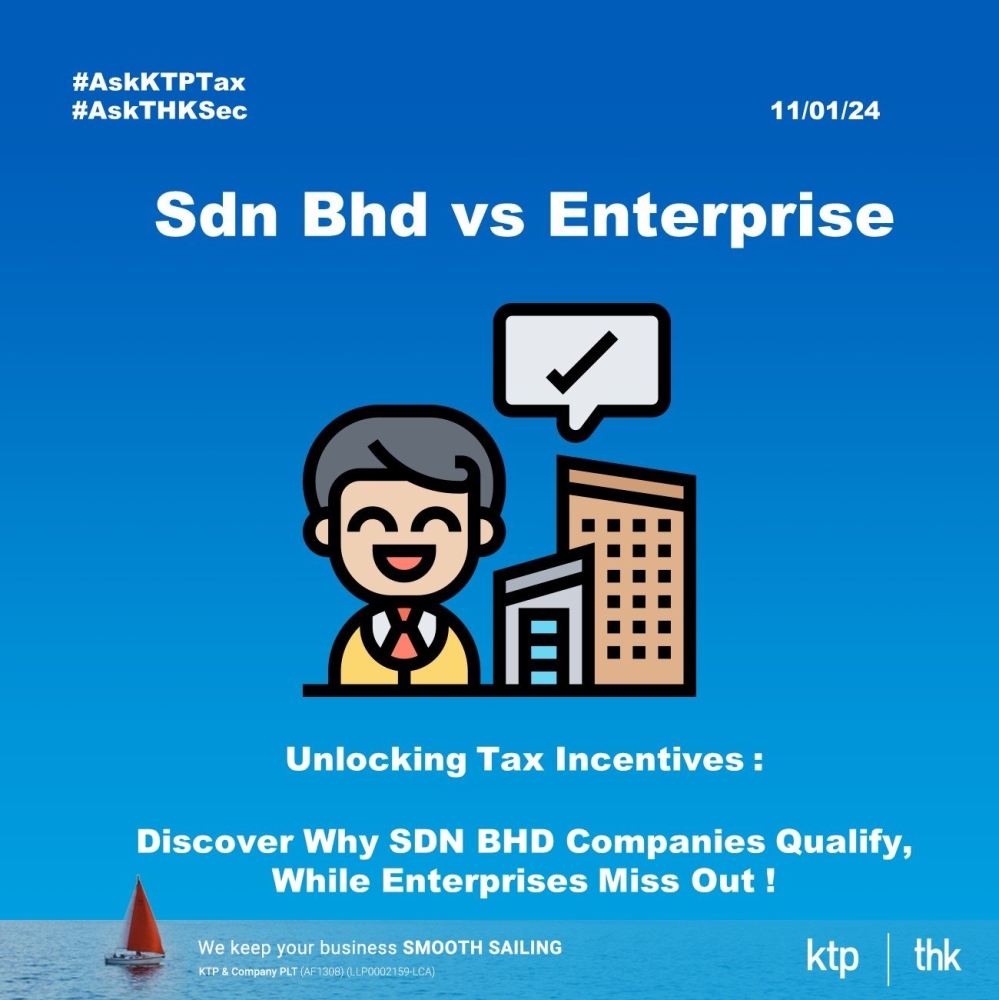
(Sec update) Unlocking Tax Incentives: Discover Why SDN BHD Companies Qualify, While Enterprises Miss Out!
Why Sdn Bhd ?
In the vibrant tapestry of Malaysia's business landscape, the decision to venture as an entrepreneur or establish a Sendirian Berhad (Sdn Bhd) is a critical crossroads that warrants careful consideration. While entrepreneurship embodies the spirit of innovation and individualism, incorporating an Sdn Bhd unveils a realm of strategic advantages that can significantly propel your business forward.
Let's delve into the compelling reasons why choosing the corporate path might be the catalyst for unlocking your business potential.
What Sets Apart Sdn Bhd and Entrepreneurship in Malaysia?
The fundamental distinction lies in the legal structure.
Sdn Bhd represents a private limited company, offering legal separation from personal assets, while entrepreneurship often involves individuals operating as sole proprietors without such distinction.
Limited Liability: How Does it Differ in Malaysia?
Entrepreneurs in Malaysia face unlimited personal liability, exposing personal assets to business risks. Contrastingly, Sdn Bhd owners benefit from limited liability, creating a protective shield for personal finances.
Tax Implications: How Does the Choice Affect Taxation in Malaysia?
In the realm of taxation in Malaysia, entrepreneurs find themselves grappling with the impact of their choices on personal income tax and corporate tax. While individual business owners are subjected to personal income tax on their profits, the landscape changes for Sdn Bhd companies, where the focus shifts to corporate tax.
This distinction significantly shapes the tax liability, with Sdn Bhd companies potentially benefiting from lower corporate tax rates and access to tax incentives, thereby creating a more advantageous tax environment.
Tax incentives are benefits that the government offers to certain businesses to encourage investment and development in Malaysia. Some of the tax incentives are:
-
Pioneer status (PS) : a full or partial exemption of income tax for a period of five years for businesses that produce or do something new or important.
-
Investment tax allowance (ITA) : an extra deduction of capital expenditure for a period of five years for businesses that invest in a new or important project.
Government Grants in Malaysia: A Comparative Analysis for Sdn Bhd, Sole Proprietors, and Partnerships
Private limited companies, commonly referred to as Sdn Bhd, often enjoy more favorable treatment when it comes to government grants and incentives. The Malaysian government frequently tailors these programs to encourage the growth and development of structured businesses.
Sdn Bhd entities generally have access to a broader range of support initiatives, including tax incentives, financial assistance, and industry-specific grants. Conversely, sole proprietors and partnerships may find that their eligibility for government grants is more restricted.
Capital Raising Dynamics: Malaysia's Entrepreneurial Landscape vs Sdn Bhd
Entrepreneurs in Malaysia may find it challenging to raise significant capital individually. Sdn Bhd owners can issue shares, providing a more accessible avenue to attract investors and fund business expansion with financial institution.
Risk Management: Structured Approach vs Personal Liability in Malaysia
Operating as an Sdn Bhd in Malaysia offers a structured approach to risk management, with limited liability safeguarding personal assets. Entrepreneurs, however, bear full personal liability for business risks.
Legal Compliance: Navigating Regulations in Malaysia
Sdn Bhd owners in Malaysia must adhere to complex legal compliance requirements, including audits and regulatory filings. Entrepreneurs, while subject to legal requirements, face a generally simpler compliance landscape.
Key Takeaway
In conclusion, the choice between operating as an Sdn Bhd and pursuing entrepreneurship in Malaysia involves multifaceted considerations. Entrepreneurs and business owners must carefully weigh these factors against their unique circumstances and aspirations, making an informed decision aligned with the dynamic Malaysian business landscape.
PS : Authored by Mohammad Syazwan Bin Ishak, our secretary associates in THK, in his personal LinkedIn post
Visit Us
-
Wisma KTP, 53 Jalan Molek 1/8, Taman Molek, 81100 Johor Bahru
-
Wisma THK, 41, Jalan Molek 1/8, Taman Molek, 81100 Johor Bahru
KTP (Audit, Tax, Advisory)
An approved audit firm and licensed tax firm operating under the KTP group based in Johor Bahru providing audit, tax planning, advisory and compliance services to clients
-
Website www.ktp.com.my
-
Instagram https://bit.ly/3Rko5kN
-
Linkedin https://bit.ly/3sapf4l
-
Telegram http://bit.ly/3ptmlpn
THK (Secretarial, Bookkeeping, Payroll, Advisory)
A licensed secretarial firm in Johor Bahru providing fast reliable incorporation, secretarial services, corporate compliance services, outsourcing bookkeeping, and payroll services to clients
-
Website www.thks.com.my
-
Facebook https://bit.ly/3nQ98rs
KTP Lifestyle
An internal community for our colleagues on work and leisure.
-
Tiktok http://bit.ly/3u9LR6Q
-
Youtube http://bit.ly/3ppmjyE
-
Facebook http://bit.ly/3ateoMz
-
Instagram https://bit.ly/3jZpKLo
KTP Career
An external job community on vacancies in Johor Bahru for interns, graduates & experienced candidates.
-
Instagram https://bit.ly/3u2PxHg
-
Facebook http://bit.ly/3rPxz9o
Real Property Company Tax 2024

(Tax update) Real Property Company (RPC) under Capital Gain Tax (CGT)
What is an RPC?
A Real Property Company (RPC) in the context of Malaysian tax law is typically a company whose primary business is dealing with real property, such as land or buildings. This can include activities like buying, selling, developing, or renting real estate.
Technically speaking, we use 75% of the value of the company’s total tangible assets as benchmark to define RPC .
Tax Treatment of RPCs:
Traditionally, gains or profits from the disposal of shares in Malaysian RPCs were subject to Real Property Gains Tax (RPGT) under Paragraph 34A, Schedule 2 of the Real Property Gain Tax Act 1976.
However, with the introduction of Capital Gains Tax (CGT), there have been amendments to these provisions.
Tax Computation and Formula:
The specific computation and formula for the taxation of RPCs under RPGT would depend on various factors such as the period of holding the property, the nature of the gains (capital or income), and specific exemptions or relief available.
Typically, RPGT is calculated based on the difference between the acquisition cost and the disposal price of the real property or shares in the RPC. The tax rates range from 0% to 30% depending on the factors mentioned above.
Challenges in RPC Tax Computation (Past) and Taxpayer Preferences
Previously, calculating taxes for Real Property Companies (RPCs) in Malaysia was complex due to complicated Real Property Gains Tax (RPGT) rules. Factors like how long the property was held, various exemptions, and the property's market value made the process challenging.
This complexity led many Malaysian taxpayers to consult lawyers instead of tax agents for RPGT issues, believing lawyers were better suited to handle the legal aspects of property taxes.
We HATE RPC companies as most of them trust lawyers than us.
Summary of Income Tax (Exemption) (No.7) Order 2023:
This order provides an exemption from income tax on gains or profits from the disposal of shares in unlisted Malaysian companies between 1 January 2024 and 29 February 2024.
This exemption does not apply to gains or profits taxable as business income under section 4(a) of the Income Tax Act 1967.
For RPC shares, traditionally subject to RPGT, there seems to be a ''2-month tax holiday period'' due to the CGT exemption and the lack of simultaneous reversal of amendments in RPGTA.
Our Comments on RPC Shares
Before CGT, gains from disposal of shares in Malaysia were considered capital gains and not subject to income tax.
With CGT's implementation, RPGT on gains from disposal of RPC shares by companies, LLPs, trust bodies, or co-operative societies (except Labuan entities) is not applicable from 1 January 2024.
However, due to the 2-month CGT exemption on unlisted shares and no simultaneous amendment reversal in RPGTA, there's a temporary ''tax holiday'' for gains from RPC shares disposals.
Past Blog
Capital gain tax https://www.ktp.com.my/blog/malaysias-budget-2024-capital-gain-tax-part1/23nov23
Exemption Period on CGT https://www.ktp.com.my/blog/capital-gain-tax-malaysia-2024/04jan24
Understanding Profitability Ratios
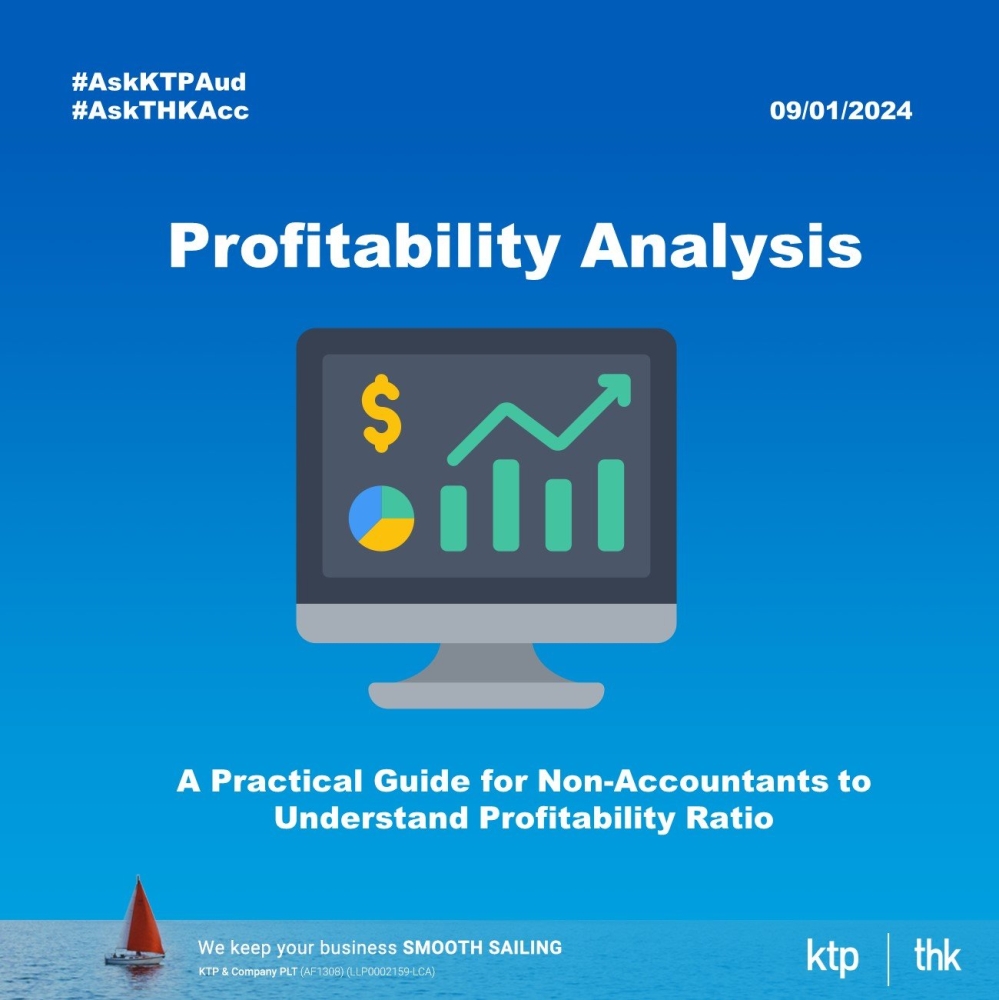
{Acc Update} Understanding Profitability Ratios
Understanding your company's financial health is key to success, especially for small and medium enterprises (SMEs) in Malaysia. Our 'Understanding Profitability Ratios: A Practical Guide for Non-Accountants''‘ is designed to simplify financial insights for non-English speakers.
At THK, a leading accounting firm in Malaysia in Southern region, we provide comprehensive services in auditing, taxation, bookkeeping, corporate secretarial, and business advisory. This guide uses straightforward language to explain crucial financial concepts, helping you make informed decisions for your business.
Simplified analytical tools are key to unlocking the mysteries of financial data, offering clear insights into a company's financial story. These tools, especially profitability ratios, are easy to understand and vital for assessing a company's efficiency, stability, and overall financial health.
Simplified Guide to Profitability Ratios:
Join us as we explore four key types of profitability ratios in an easy-to-understand format:
Gross Profit Margin
-
What It Means: This ratio shows what a business earns after paying for the direct costs of making its products or providing services (like labor and materials).
-
Simple Formula: (Gross Profit / Net Sales) x 100%
-
Why It's Important: It helps you understand how well the company is controlling its direct costs.
Operating Expense Ratio
-
What It Means: This ratio helps us look at a company's overall costs and how efficiently it handles its everyday operations.
-
Simple Formula: (Total Operating Expenses / Net Sales) x 100%
-
Why It's Important: It shows how effectively a company is managing its regular expenses compared to its income.
Pre-Tax Profit Margin
-
What It Means: This tells us what percentage of sales becomes profit before considering income tax.
-
Simple Formula: (Profit Before Tax / Net Sales) x 100%
-
Why It's Important: It offers insights into how efficiently a company operates and earns profit before taxes.
Net Profit Margin
-
What It Means: This ratio reveals the actual profit a company makes in a year, after taxes are paid.
-
Simple Formula: (Profit After Tax / Net Sales) x 100%
-
Why It's Important: It gives a clear view of the company's ultimate profitability after tax expenses.
In conclusion, understanding these profit ratios is crucial for the financial well-being of your business. Our firm, KTP, is dedicated to assisting Malaysian SMEs in navigating their financial journey with our expert auditing, taxation, bookkeeping, corporate secretarial, and business advisory services.
Visit our websites at www.ktp.com.my and www.thks.com.my for more insights and professional assistance.
An Overview of StockTake

(Aud Update) The Essential Role of Stocktaking in Auditing
Auditor Role In Stocktaking
As the financial year unfolds, auditors across the world engage in a crucial practice: stocktaking.
For many new or transferred clients unfamiliar with this procedure, questions often arise about its importance and necessity.
Stocktaking is not merely a routine task; it is a fundamental aspect of auditing that ensures the accuracy and integrity of a company’s financial statements.
This period of intense activity is not just about counting physical inventory; it’s a process deeply rooted in verifying the existence, condition, and valuation of assets.
ISA 501 Audit Evidence
ISA 501-''Audit Evidence—Specific Considerations for Selected Items,'' is the key standard guiding auditors on stocktake, or inventory counting.
It requires auditors to physically attend inventory counts to verify the existence and condition of inventory, unless it's impractical.
When direct attendance isn't possible, auditors must use alternative methods, like remote verification, to ensure the reliability of the inventory data.
Audit Opinion on Stocktake
If an #auditor is unable to obtain sufficient and appropriate audit evidence regarding the existence and completeness of inventory, whether by attending the stocktake or through alternative procedures, this could result in a limitation of scope in the audit opinion.
In some cases, if the impact is both material and pervasive, a disclaimer of the audit opinion may be necessary.
Happy Stocktaking! Happy New Year.
Visit Us
-
Wisma KTP, 53 Jalan Molek 1/8, Taman Molek, 81100 Johor Bahru
-
Wisma THK, 41, Jalan Molek 1/8, Taman Molek, 81100 Johor Bahru
KTP (Audit, Tax, Advisory)
An approved audit firm and licensed tax firm operating under the KTP group based in Johor Bahru providing audit, tax planning, advisory and compliance services to clients
-
Website www.ktp.com.my
-
Instagram https://bit.ly/3jZuZuI
-
Linkedin https://bit.ly/3sapf4l
-
Telegram http://bit.ly/3ptmlpn
THK (Secretarial, Bookkeeping, Payroll, Advisory)
A licensed secretarial firm in Johor Bahru providing fast reliable incorporation, secretarial services, corporate compliance services, outsourcing bookkeeping, and payroll services to clients
-
Website www.thks.com.my
-
Facebook https://bit.ly/3nQ98rs
KTP Lifestyle
An internal community for our colleagues on work and leisure.
-
Tiktok http://bit.ly/3u9LR6Q
-
Youtube http://bit.ly/3ppmjyE
-
Facebook http://bit.ly/3ateoMz
-
Instagram https://bit.ly/3jZpKLo
KTP Career
An external job community on vacancies in Johor Bahru for interns, graduates & experienced candidates.
-
Instagram https://bit.ly/3u2PxHg
-
Facebook http://bit.ly/3rPxz9o
What is the compensation for late refund of overpayment of tax?
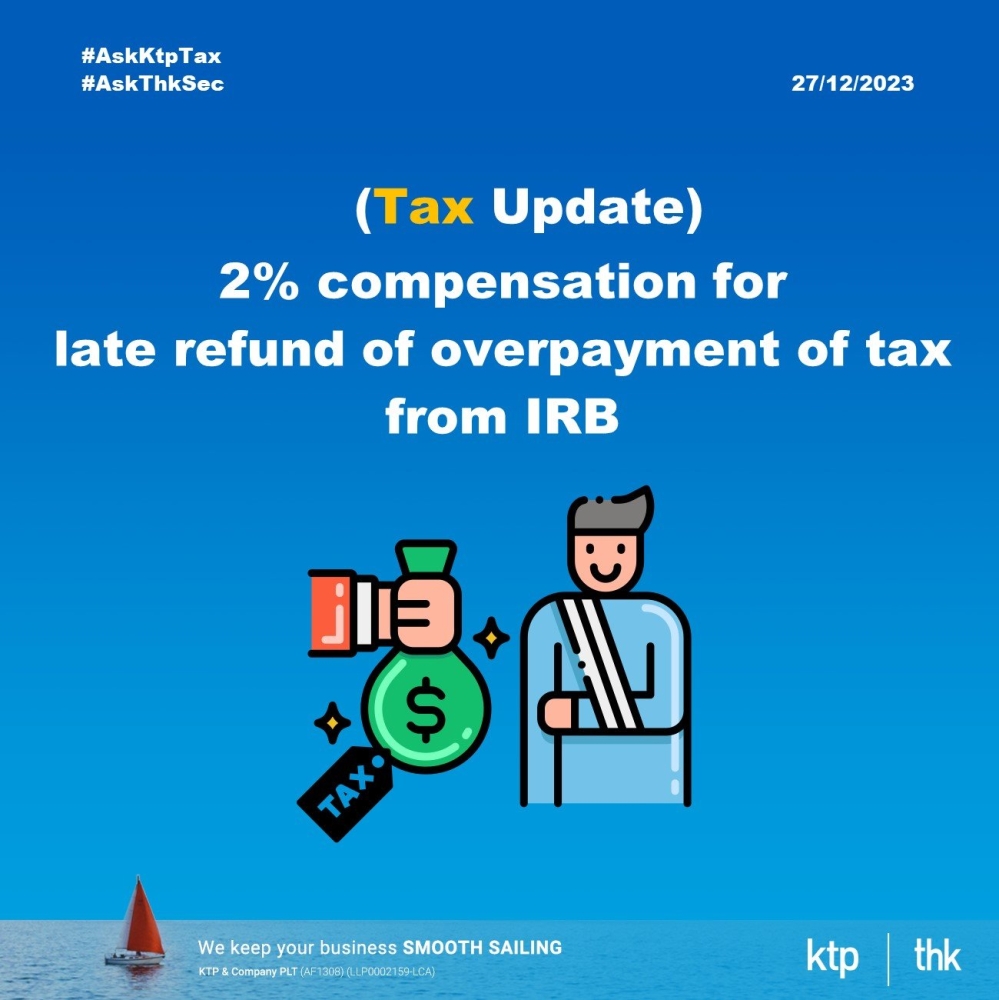
{Tax Update} Compensation of Late Tax Refund 2%
2% Compensation
Recently many taxpayers received an email from IRB on the approval of a 2% compensation payment for delayed refund of overpaid income tax. The payment, processed by an approved bank in Malaysia, follows a formula under subsection 111D(2) of the Income Tax Act 1967.
It also includes a legal disclaimer indicating that the Director-General of Inland Revenue retains the right to recover the payment if it's found to have been made erroneously or based on the taxpayer's incorrect information.
Operational Guideline Updates: Compensation on Late Refund of Overpayment of Tax
Updated on 21 May 2021 from IRB, this guideline is to clarify payment of compensation for late refund of overpayment of tax made by IRB. under Section 111D of the Income Tax Act 1967 (ITA).
What are the criteria for compensation?
It's imperative to submit the income tax return form accurately and comprehensively by the specified deadline, or within any extended timeframe granted by the Inland Revenue Board (IRB).
The deadlines are as follows:
-
Individuals with employment income: Submission is required by April 30th.
-
Individuals with business income: The deadline is set for June 30th.
-
Companies, Limited Liability Partnerships, and Societies: Submissions should be made within seven months following the day after the business's accounting period concludes.
Type of tax payment eligible for tax refund
Only the following type of payment will get a tax refund:
-
PCB: Monthly tax deduction
-
CP500: Installment Payment Notice
-
CP204/CP205: Estimated Tax Payable by Companies/Limited Liability Partnership/Society
Timelines of calculation of compensation
The compensation is calculated on a daily basis, starting from the first day after the period stated below:
-
via E-filling: After 90 days from the submission deadline
-
via post/courier: After 120 days from the submission deadline
How to calculate?
Compensation of 2% shall be paid in accordance with the following formula:
𝑻𝒂𝒙 𝒓𝒆𝒇𝒖𝒏𝒅 ×𝑻𝒐𝒕𝒂𝒍 𝒏𝒐.𝒐𝒇 𝒅𝒂𝒚𝒔 𝒍𝒂𝒕𝒆 𝟑𝟔𝟓/𝟑𝟔𝟔 𝒅𝒂𝒚𝒔 × 2%
Taxpayers who are not eligible to be paid compensation
-
Tax returns submitted after the due date in accordance with the ITA.
-
Tax set off under Section 110 of the ITA is in excess of tax payable.
-
Assessment raised by IRB under Sections 90(3), 91, 91A, 92 and 96A of the ITA.
-
The taxpayer applied for an extension of time for the submission of the tax return.
-
There's an appeal against the assessment.
-
There is an additional tax payable from IRB audit during the 90 or 120 days from the submission deadline.
-
The excess tax paid is not from installment payments under Sections 107, 107B and 107C of the ITA.
Visit Us
-
Wisma KTP, 53 Jalan Molek 1/8, Taman Molek, 81100 Johor Bahru
-
Wisma THK, 41, Jalan Molek 1/8, Taman Molek, 81100 Johor Bahru
KTP (Audit, Tax, Advisory)
An approved audit firm and licensed tax firm operating under the KTP group based in Johor Bahru providing audit, tax planning, advisory and compliance services to clients
-
Website www.ktp.com.my
-
Instagram https://bit.ly/3Rko5kN
-
Linkedin https://bit.ly/3sapf4l
-
Telegram http://bit.ly/3ptmlpn
THK (Secretarial, Bookkeeping, Payroll, Advisory)
A licensed secretarial firm in Johor Bahru providing fast reliable incorporation, secretarial services, corporate compliance services, outsourcing bookkeeping, and payroll services to clients
-
Website www.thks.com.my
-
Facebook https://bit.ly/3nQ98rs
KTP Lifestyle
An internal community for our colleagues on work and leisure.
-
Tiktok http://bit.ly/3u9LR6Q
-
Youtube http://bit.ly/3ppmjyE
-
Facebook http://bit.ly/3ateoMz
-
Instagram https://bit.ly/3jZpKLo
KTP Career
An external job community on vacancies in Johor Bahru for interns, graduates & experienced candidates.
-
Instagram https://bit.ly/3u2PxHg
-
Facebook http://bit.ly/3rPxz9o
Loans and Financial Assistance to Directors
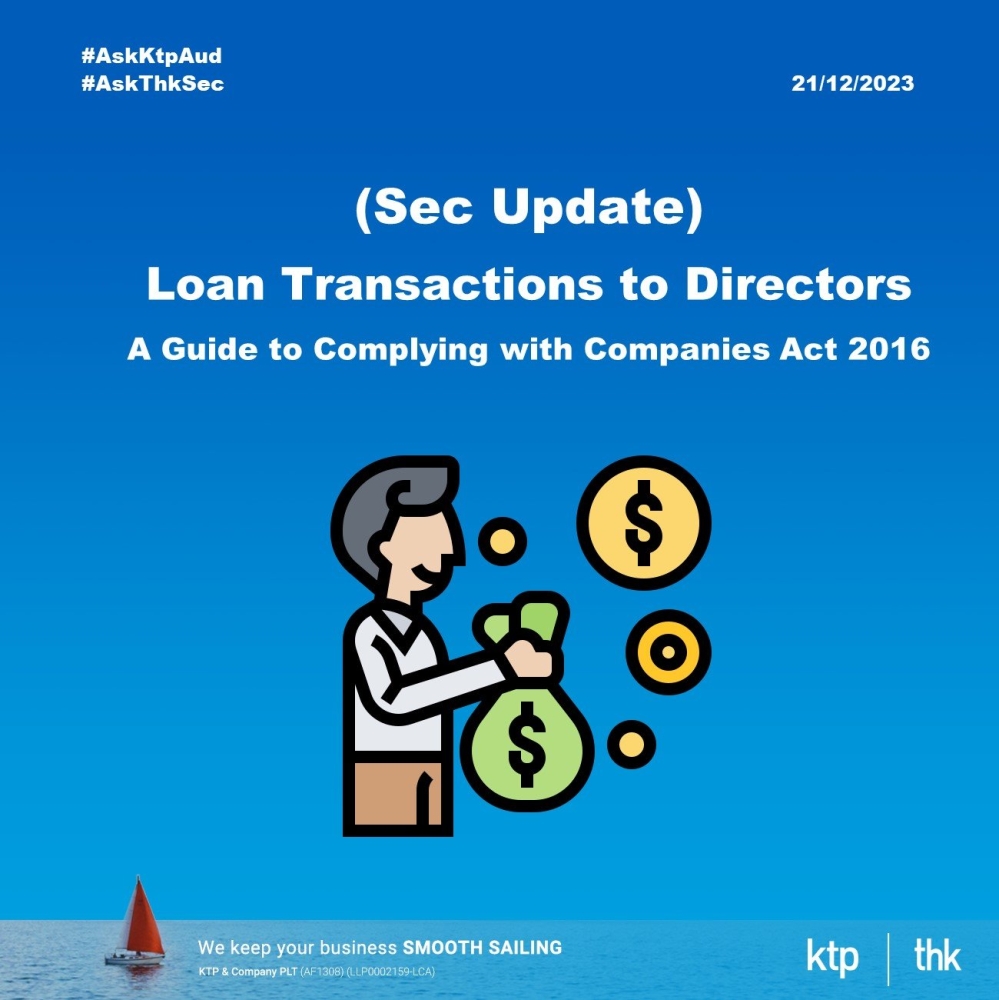
{Acc Update} Loan Transactions and Financial Assistance for Directors: A Guide to Complying with Companies Act 2016
Navigating the Companies Act 2016 is essential for companies, when considering loans to directors and financial assistance. In this guide, we explore the nuances of these transactions, highlighting key provisions of the Companies Act 2016.
Whether you're an Exempt Private Company (EPC) or a Private Limited Company, understanding these regulations is vital for maintaining compliance and corporate integrity.
Loan to Directors
As per Section 224(1) of the Companies Act 2016, a company is prohibited from:
-
making a loan to a director of the company or a company deemed related under Section 7 of the Company Act 2016, or
-
entering into any guarantee or providing any security for a loan made to such a director by any other person.
Forms of Loan to Directors
There are three types of loans to directors:
-
Cash advances: Typically, short-term and repaid in lump sum.
-
Payment on behalf of the Director
-
Loan formalized in an agreement: Usually for the longer term and repaid by installments.
Guarantee
A guarantee is a contract to perform a promise or discharge the liability of a third person in case of default.
Example: If a director takes a loan from bank , the Company provides a corporate guarantee to the bank.
Security
Security is an asset pledged to guarantee loan repayment, satisfaction of an obligation, or compliance with an agreement.
Example: A director takes a loan from bank and Company allows a charge to be placed on its land in favor of the bank.
Approval Loans to Directors of Exempt Private Company (EPC)
-
Allowed for any purpose.
-
Board’s approval is required.
-
If the loan to the director/shareholder is interest-free, the Board must justify that this decision is in the Company’s best interest.
-
The loan must be repaid within 12 months.
Financial Assistance
According to Section 123(1) of the Company Act 2016, financial assistance given to any person to purchase existing company shares or to subscribe for new shares is prohibited.
Allowable Financial Assistance
-
For private or unlisted public companies, not exceeding 10% of shareholders’ funds, Shareholders’ Approval and Directors’ Solvency Statement are required.
-
Employee share option scheme (subscription of new shares) for the benefit of employees and executive directors.
-
Purchase of fully-paid shares, registered in the name of the employee or a nominee company.
-
Business nature exceptions:
a) Licensed money lenders
b) Asset management company registered with the Securities Commission
It is crucial to handle loan and financial assistance transactions carefully to ensure compliance with the Companies Act.
Visit Us
-
Wisma KTP, 53 Jalan Molek 1/8, Taman Molek, 81100 Johor Bahru
-
Wisma THK, 41, Jalan Molek 1/8, Taman Molek, 81100 Johor Bahru
KTP (Audit, Tax, Advisory)
An approved audit firm and licensed tax firm operating under the KTP group based in Johor Bahru providing audit, tax planning, advisory and compliance services to clients
-
Website www.ktp.com.my
-
Instagram https://www.instagram.com/ktp_audittax/
-
Linkedin https://bit.ly/3sapf4l
-
Telegram http://bit.ly/3ptmlpn
THK (Secretarial, Bookkeeping, Payroll, Advisory)
A licensed secretarial firm in Johor Bahru providing fast reliable incorporation, secretarial services, corporate compliance services, outsourcing bookkeeping, and payroll services to clients
-
Website www.thks.com.my
-
Facebook https://bit.ly/3nQ98rs
KTP Lifestyle
An internal community for our colleagues on work and leisure.
-
Tiktok http://bit.ly/3u9LR6Q
-
Youtube http://bit.ly/3ppmjyE
-
Facebook http://bit.ly/3ateoMz
-
Instagram https://bit.ly/3jZpKLo
KTP Career
An external job community on vacancies in Johor Bahru for interns, graduates & experienced candidates.
-
Instagram https://bit.ly/3u2PxHg
-
Facebook http://bit.ly/3rPxz9o
Changes to Beneficial Ownership 2023
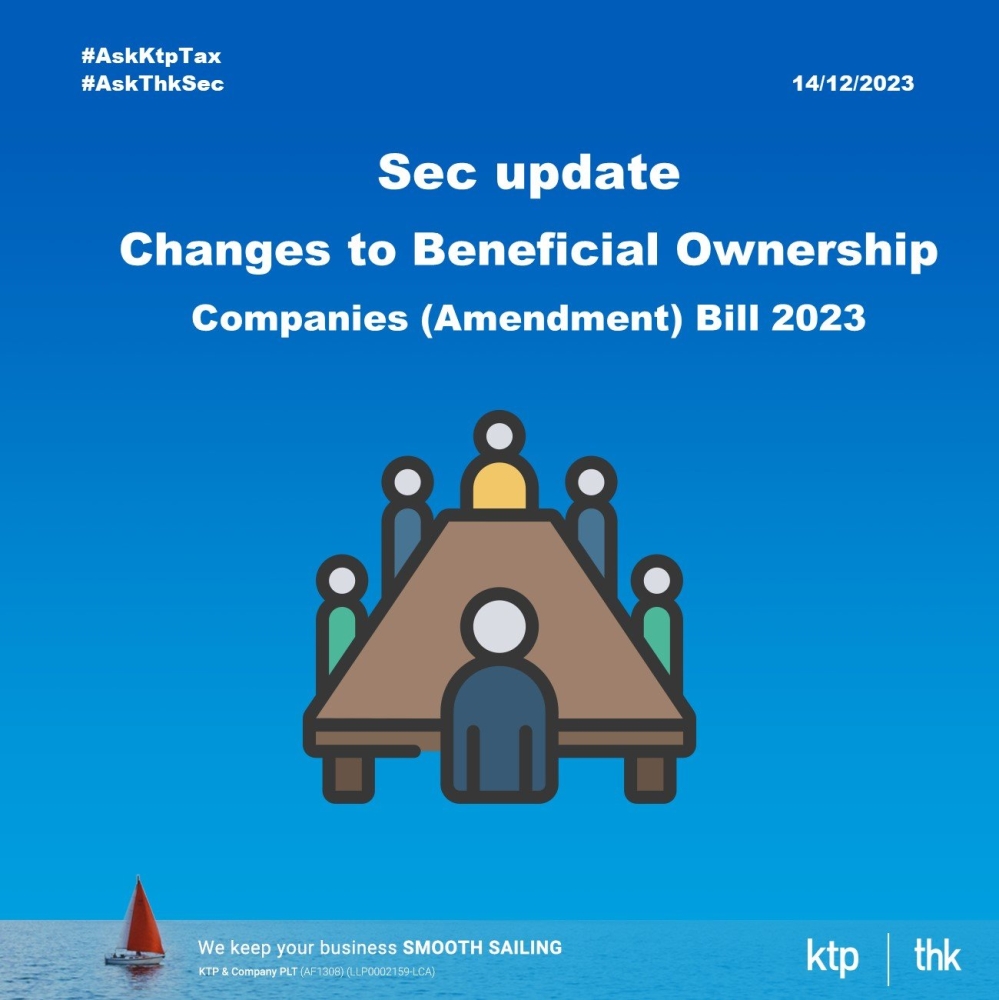
{Sec Update} Changes to Beneficial Ownership in the Companies (Amendment) Bill 2023
According to Section 2 of the Companies Act 2016, “Beneficial Owner” means the ultimate owner of the shares and does not include a nominee of any description. To strengthen the corporate rehabilitation framework and enhance corporate transparency on the reporting of beneficial ownership of companies, there are some amendments in 8 key areas related to beneficial ownership, in the Companies Amendment Bill 2023.
1. Definition of Beneficial Owner of a Company?
It is defined as the ultimate owner of the shares and does not include a nominee of any description and a relation to a company, a person is as provided in Section 60A(1).
Section 60A (1) states that a person is a beneficial owner of a company if he/she is a natural person who ultimately owns or controls over a company, which includes a person who exercises ultimate effective control over a company.
2. Guidelines to Identify a Beneficial Owner of a Company
The Registrar of Companies has issued the guidelines for the purpose of identifying beneficial ownership of a company according to Section 60A (2).
3. Companies are required to record and lodge beneficial owner information with the
Companies Commission of Malaysia (CCM)
The companies are required to record the beneficial ownership information (name, nationality, place of residence, date of becoming a beneficial owner etc.) in the Company’s register of beneficial owners upon receipt of the reply slip.
This register of beneficial owners must be kept at the registered office or any other place in Malaysia as notified to the Companies Commission of Malaysia (CCM), as stated in Section 60B (2).
In the event of any changes to the particulars in the register of beneficial owners, the company shall lodge the updated information with the CCM.
4. Access to the Beneficial Owner Information
The Minister has prescribed any person or class of persons who may access the register of beneficial owners or the information, along with the terms and conditions for accessing the register as stated in Section 60B 9(a & b).
5. Duty of Company to Issue Notices to Obtain Beneficial Owner Information
A company shall send a written notice requiring any member of the company to inform whether the member is a beneficial owner of the company. If the member is not the beneficial owner of the company, the member needs to indicate the person’s particulars who is the beneficial owner of the company, as stated in Section 60C(1)(a).
6. Duty as a beneficial owner of the company to provide information
A person who is a beneficial owner shall notify the company that he/she is a beneficial owner of the company and provide the details according to Section 60D.
7. Exempted Companies
The Minister may publish in the Gazette an exemption for any class of companies from beneficial ownership reporting, either unconditionally or subject to the terms and conditions as imposed by the Minister.
8. Penalties
The Company and every officer who contravenes this section may be liable to a fine not exceeding RM20,000.00 and a further fine of RM500 per day during which the offence continues, as stated in Section 60b(6).
In Summary
The new BO Guidelines under the Companies Amendment Bill 2023 are wider and enforce a reporting on the beneficial ownership of companies. It was tabled for 1st reading in Parliament on 10 October 2023, and was tabled and passed at the 2nd and 3rd reading in Parliament on 28 November 2023. The Bill is tentatively scheduled to be tabled at Dewan Negara in December 2023.
Visit Us
-
Wisma KTP, 53 Jalan Molek 1/8, Taman Molek, 81100 Johor Bahru
-
Wisma THK, 41, Jalan Molek 1/8, Taman Molek, 81100 Johor Bahru
KTP (Audit, Tax, Advisory)
An approved audit firm and licensed tax firm operating under the KTP group based in Johor Bahru providing audit, tax planning, advisory and compliance services to clients
-
Website www.ktp.com.my
-
Instagram https://www.instagram.com/ktp_audittax/
-
Linkedin https://bit.ly/3sapf4l
-
Telegram http://bit.ly/3ptmlpn
THK (Secretarial, Bookkeeping, Payroll, Advisory)
A licensed secretarial firm in Johor Bahru providing fast reliable incorporation, secretarial services, corporate compliance services, outsourcing bookkeeping, and payroll services to clients
-
Website www.thks.com.my
-
Facebook https://bit.ly/3nQ98rs
KTP Lifestyle
An internal community for our colleagues on work and leisure.
-
Tiktok http://bit.ly/3u9LR6Q
-
Youtube http://bit.ly/3ppmjyE
-
Facebook http://bit.ly/3ateoMz
-
Instagram https://bit.ly/3jZpKLo
KTP Career
An external job community on vacancies in Johor Bahru for interns, graduates & experienced candidates.
-
Instagram https://bit.ly/3u2PxHg
-
Facebook http://bit.ly/3rPxz9o
Federal Court's Ruling on Unlicensed Moneylending

{Sec Update} Lessons from the Federal Court's Ruling on Unlicensed Moneylending
Triple Zest Trading & Suppliers Vs Applied Business Technologies Sdn Bhd [2023]
The Federal Court in Malaysia overturned a Court of Appeal decision, ruling that an ''unlicensed moneylender'' cannot recover either interest or the principal loan amount.
Key Facts
-
Parties Involved: Triple Zest Trading & Suppliers (TZT) and Applied Business Technologies Sdn Bhd (ABT).
-
Loan Amount: RM800,000 with an additional RM800,000 as ''agreed profit''.
-
Collateral: Two parcels of land and four undated cheques valued at RM1.6 million.
-
Issue: TZT defaulted on the repayment of RM800,000 principal.
Court Decisions
-
High Court: Favored ABT, ordering TZT to pay RM1.6 million.
-
Court of Appeal: Limited TZT's liability to only the principal loan sum of RM800,000.
-
Federal Court: Overturned previous decisions, stating that unlicensed moneylenders like ABT cannot recover either the principal or interest, especially when interest rates are exorbitant (100% in this case).
Legal Reasoning
-
The Federal Court deemed the ''agreed profit'' as interest, thus violating the Moneylenders Act 1951.
-
It emphasized that the courts should not assist those who engage in illegal moneylending practices.
-
The agreement was considered void under the Contracts Act 1950.
Implications for Clients
-
Compliance with legal standards: The decision highlights the necessity for all financial transactions, including loans, to be in strict compliance with the Moneylenders Act 1951. Companies and individuals must ensure their lending practices adhere to legal requirements.
-
Risks of unlicensed lending: Engaging in unlicensed lending, particularly with exorbitant interest rates, can result in the inability to recover both the loan principal and interest. This case demonstrates the risks associated with such practices.
-
Legitimacy of ''friendly loans'': The ruling clarifies that companies and individuals can still offer ''friendly loans.'' However, these loans must not include any interest or additional sums exceeding the principal amount. Loans structured in this manner are legally permissible.
-
Prohibition of interest on ''friendly loans'': Any ''friendly loans'' that impose interest or extra charges beyond the principal amount are illegal. The courts will not assist in recovering either the interest or the principal amount in such cases, emphasizing the need for caution and legal adherence in private lending.
-
Importance of legitimate agreements: The decision stresses the importance of having legitimate and legally compliant agreements for any financial transaction.
-
Seeking legal counsel: Given the complexities and legal implications of loan agreements, it is advisable for clients to seek legal advice before entering into any financial agreements.
Conclusion
This landmark ruling serves as a critical reminder of the importance of complying with financial and legal regulations. It discourages illegal lending practices and promotes the legitimacy and enforceability of loan agreements that adhere to the law. Clients are advised to be vigilant and consult legal experts to ensure their financial dealings are within legal boundaries.
Visit Us
-
Wisma KTP, 53 Jalan Molek 1/8, Taman Molek, 81100 Johor Bahru
-
Wisma THK, 41, Jalan Molek 1/8, Taman Molek, 81100 Johor Bahru
KTP (Audit, Tax, Advisory)
An approved audit firm and licensed tax firm operating under the KTP group based in Johor Bahru providing audit, tax planning, advisory and compliance services to clients
-
Website www.ktp.com.my
-
Instagram https://www.instagram.com/ktp_audittax/
-
Linkedin https://bit.ly/3sapf4l
-
Telegram http://bit.ly/3ptmlpn
THK (Secretarial, Bookkeeping, Payroll, Advisory)
A licensed secretarial firm in Johor Bahru providing fast reliable incorporation, secretarial services, corporate compliance services, outsourcing bookkeeping, and payroll services to clients
-
Website www.thks.com.my
-
Facebook https://bit.ly/3nQ98rs
KTP Lifestyle
An internal community for our colleagues on work and leisure.
-
Tiktok http://bit.ly/3u9LR6Q
-
Youtube http://bit.ly/3ppmjyE
-
Facebook http://bit.ly/3ateoMz
-
Instagram https://bit.ly/3jZpKLo
KTP Career
An external job community on vacancies in Johor Bahru for interns, graduates & experienced candidates.
-
Instagram https://bit.ly/3u2PxHg
-
Facebook http://bit.ly/3rPxz9o
{Sec Update} Essential Documents after Shareholder's Death
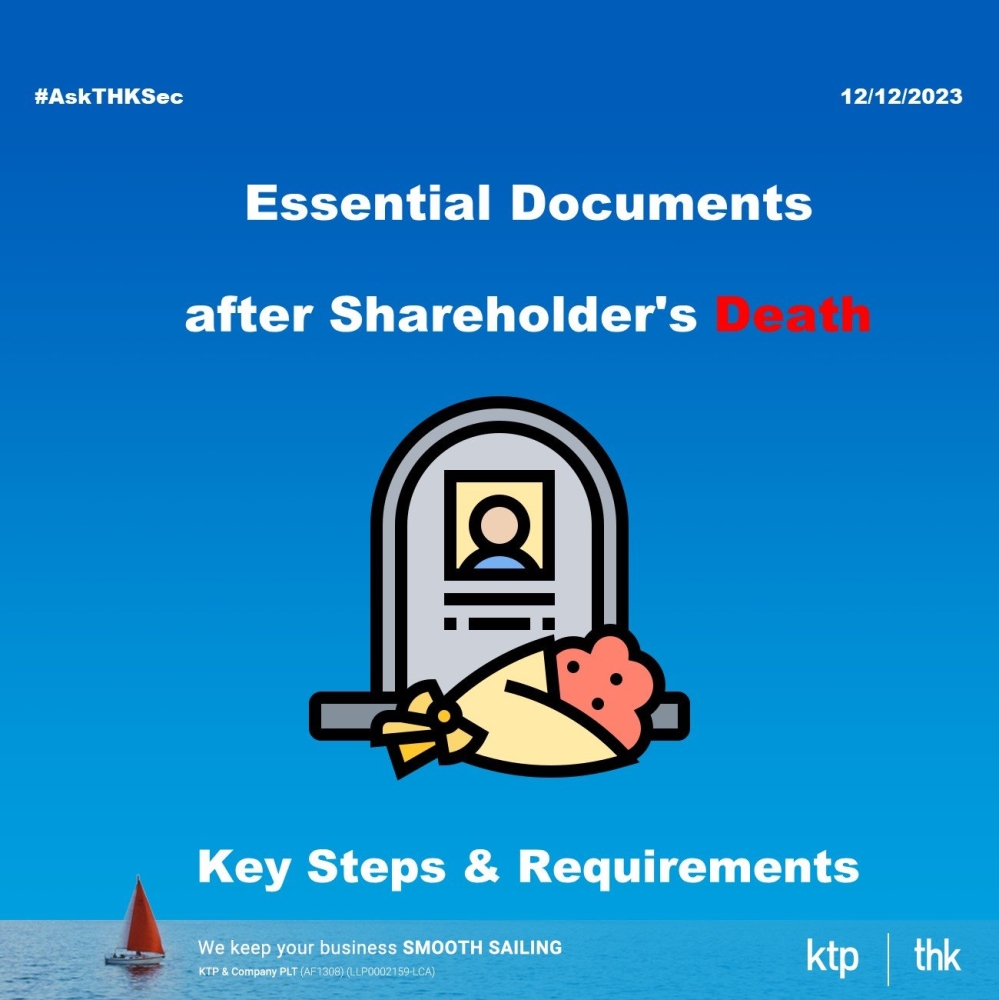
{Sec Update} Essential Documents after Shareholder's Death : Key Steps & Requirements
Introduction of Shares Transmission
In the corporate realm, the passing of a shareholder introduces a complex and often overlooked challenge—effectively managing their shares posthumously. This article explores the legal process, and emotional considerations involved in this delicate process of handling shares after a shareholder's demise.
This exploration serves not only as a practical guide for those involved but also as a reminder of the importance of proactive succession planning in preserving corporate legacies.
What is the first step a director should take upon the death of a shareholder?
1. Legal representative
• The director should find and establish contact with the legal representative of the deceased shareholder. This individual plays a crucial role in facilitating the proper handling and transmission of shares.
2. Supporting Document
• Ensuring the availability of crucial supporting documents, such as the grant of probate, letter of administration, or Faraid Certificate, is imperative for a seamless share transmission process. These documents are essential for initiating and completing the necessary legal procedures.
The Legal Title of Deceased Shareholders
When a shareholder passes away, who is recognized by the company as having title to their shares, and how can the transmission process carry out?
-
The legal representative becomes the sole individual acknowledged by the company as having title to the deceased shareholder's shares.
-
The shares can be transmitted to the legal representative upon their request, along with the submission of the grant of probate or letter of administration to the company.
-
The legal representative holds the authority to transfer the shares to the designated beneficiary or another appointed individual.
What are the Crucial Supporting Documents for Smooth Share Transmission?
1. Non-Muslim with a Will:
• Requirement: Grant of Probate issued by the High Court.
• Process: Handled by the executor empowered to administer the estate.
2. Non-Muslim without a Will:
• Requirement: Letter of Administration issued by the High Court or Land Administrator.
• Process: Administered by an appointed administrator empowered to handle the estate.
3. Muslim:
• Requirement: Faraid Certificate issued by the Syariah Court.
• Process: Administered by Amanah Raya, empowered to handle the estate.
In conclusion, this article underscores the complexity of managing a deceased shareholder's shares in the corporate realm. Emphasizing the necessity of proactive succession planning, it highlights the crucial supporting documents required for smooth share transmission.
The conclusion emphasizes the director's pivotal role in promptly engaging with the legal representative and ensuring the availability of essential paperwork. This proactive involvement is key to achieving a seamless share transmission process, ultimately safeguarding the company's interests following a shareholder's passing.
Visit Us
-
Wisma KTP, 53 Jalan Molek 1/8, Taman Molek, 81100 Johor Bahru
-
Wisma THK, 41, Jalan Molek 1/8, Taman Molek, 81100 Johor Bahru
KTP (Audit, Tax, Advisory)
An approved audit firm and licensed tax firm operating under the KTP group based in Johor Bahru providing audit, tax planning, advisory and compliance services to clients
-
Website www.ktp.com.my
-
Instagram https://www.instagram.com/ktp_audittax/
-
Linkedin https://bit.ly/3sapf4l
-
Telegram http://bit.ly/3ptmlpn
THK (Secretarial, Bookkeeping, Payroll, Advisory)
A licensed secretarial firm in Johor Bahru providing fast reliable incorporation, secretarial services, corporate compliance services, outsourcing bookkeeping, and payroll services to clients
-
Website www.thks.com.my
-
Facebook https://bit.ly/3nQ98rs
KTP Lifestyle
An internal community for our colleagues on work and leisure.
-
Tiktok http://bit.ly/3u9LR6Q
-
Youtube http://bit.ly/3ppmjyE
-
Facebook http://bit.ly/3ateoMz
-
Instagram https://bit.ly/3jZpKLo
KTP Career
An external job community on vacancies in Johor Bahru for interns, graduates & experienced candidates.
-
Instagram https://bit.ly/3u2PxHg
-
Facebook http://bit.ly/3rPxz9o
Personal Tax Relief 2023 Malaysia

{Tax Update} Personal Tax Relief 2023 Malaysia
Personal Relief Year Assessment 2023
Welcome to the latest insights on Personal Tax Relief for the year 2023, brought to you by KTP , Malaysia's trusted authority in auditing and tax services.
As we navigate the complexities of the new tax year, understanding the updated tax reliefs can significantly impact your financial planning. From 'Family and Dependent Care' to 'Lifestyle and Technology' benefits, our comprehensive guide dives deep into the six (6) essential categories of tax deductions available for Malaysian taxpayers.
Whether you're a working professional, a parent, or planning for your future, stay informed with KTP's expert analysis and strategies to maximize your tax savings this year.
royalty withholding tax malaysia

{Tax Update} Withholding Tax on Royalties
Latest Development on Royalties
In a significant development impacting cross-border software and intellectual property transactions, the Inland Revenue Board (IRB) has recently issued Practice Note No. 3/2023 dated 5th December 2023.
This document provides essential clarifications on the tax treatment of copyright and software payments made by distributors and resellers to non-residents.
This update highlights the categorization of such payments as royalties, bringing them under the purview of withholding tax as per Section 109 of the ITA, thereby affecting numerous businesses engaged in digital transactions and software distribution.
Key Takeaway of PN 3/2023 Tax Treatment on Copyright and Software Payments by Distributor & Reseller to Non-Resident
-
The payments for the use or right to use copyright and software, even when modified, exploited, or distributed, are considered royalties.
-
These royalties are subject to withholding tax under section 109 of the Income Tax Act 1967, especially when paid to non-residents who do not have a permanent establishment in Malaysia.
-
This applies regardless of the rights granted to the distributor or reseller.
-
Reference should be made to Double Taxation Avoidance Agreements for specific cases.
Drafted PR on Tax Treatment Regarding Royalties for Payment of Software to a Non-Resident on October 2023
Key points include:
Definition of royalties and service fees:
Royalties are defined as payments for the purchase or use of, or the right to use, an application, including purchases where the intellectual property belongs to the original owner.
Service fees, on the other hand, refer to payments for services provided by the non-resident, such as developing relevant functions for the payer's use.
Withholding tax implications:
Royalty payments to non-residents are subject to withholding tax under section 109 of the Income Tax Act 1967. This is a critical point as failure to comply with withholding tax requirements can result in significant penalties.
Payments considered service fees fall under a different category and are subject to withholding tax under section 109B of the ITA.
Consequences for non-compliance:
If a payer fails to deduct and remit the required withholding tax, the unpaid amount will increase by 10%, becoming a government debt.
Additionally, payments that are not compliant with withholding tax requirements may be disallowed as expenses in the taxpayer's tax computation.
Relief and appeal processes
The ruling also discusses relief and appeal processes in cases where taxpayers believe their software royalties' tax treatment is incorrect. This could involve Double Taxation Avoidance Agreements (DTA) and domestic tax laws.
Consult a tax professional opinion to examine the transaction and understand the potential implications.
Visit Us
-
Wisma KTP, 53 Jalan Molek 1/8, Taman Molek, 81100 Johor Bahru
-
Wisma THK, 41, Jalan Molek 1/8, Taman Molek, 81100 Johor Bahru
KTP (Audit, Tax, Advisory)
An approved audit firm and licensed tax firm operating under the KTP group based in Johor Bahru providing audit, tax planning, advisory and compliance services to clients
-
Website www.ktp.com.my
-
Instagram https://bit.ly/3jZuZuI
-
Linkedin https://bit.ly/3sapf4l
-
Telegram http://bit.ly/3ptmlpn
THK (Secretarial, Bookkeeping, Payroll, Advisory)
A licensed secretarial firm in Johor Bahru providing fast reliable incorporation, secretarial services, corporate compliance services, outsourcing bookkeeping, and payroll services to clients
-
Website www.thks.com.my
-
Facebook https://bit.ly/3nQ98rs
KTP Lifestyle
An internal community for our colleagues on work and leisure.
-
Tiktok http://bit.ly/3u9LR6Q
-
Youtube http://bit.ly/3ppmjyE
-
Facebook http://bit.ly/3ateoMz
-
Instagram https://bit.ly/3jZpKLo
KTP Career
An external job community on vacancies in Johor Bahru for interns, graduates & experienced candidates.
-
Instagram https://bit.ly/3u2PxHg
-
Facebook http://bit.ly/3rPxz9o
Transfer Pricing 2023

{Tax Update} Malaysia's 2023 Transfer Pricing Rules Update: Navigating New Challenges
Latest Development on Trans Pricing (TP) Rules 2023
The technical update on the changes in Transfer Pricing (TP) ruling in Malaysia from the TP Rules 2012 to TP Rules 2023 highlights several key areas where modifications have been made.
Here's a refined comparison and outline of the changes:
Definition of CTPD (Controlled Transaction Pricing Documentation)
TP Rules 2012: Defined as documentation created during the development or implementation of a controlled transaction and updated for material changes.
TP Rules 2023: Redefined to emphasize documentation prepared before the due date of a tax return in the year a controlled transaction is entered.
Timeline to Furnish the CTPD
TP Rules 2012: No specific timeline for furnishing CTPD upon request.
TP Rules 2023: CTPD must be available within 14 days upon request by the Malaysia Inland Revenue Board (MIRB).
Content of CTPD
TP Rules 2012: Lacked requirements for including MNE Group information, detailed business information, completion date, and applicability indication.
TP Rules 2023: Mandates inclusion of extensive MNE Group information, detailed business information guidance, completion date, and indications of inapplicable information.
Definition of Arm’s Length Range
TP Rules 2012: No definition, but practice often used the 25th to 75th percentile range.
TP Rules 2023: Defined as a range or a single figure between the 37.5th to 62.5th percentiles of the benchmarking data set.
TP Adjustment
TP Rules 2012: Silent on adjustment specifics within or outside the arm’s length range.
TP Rules 2023: Allows MIRB to adjust to the median if outside the range, and to the median or above if within the range under certain conditions.
Selection of the Most Appropriate TP Method
TP Rules 2012: A hierarchy-based selection of TP methods with no power for the Director General to revise the taxpayer's selected method.
TP Rules 2023: Removes the hierarchy of methods and gives the MIRB authority to replace the taxpayer's chosen method if deemed inappropriate.
Key Points to Note for Taxpayers on TP Rules 2023:
Documentation Timeliness:
The new rules emphasize the need for timely preparation and submission of CTPD, which must now be done before the tax return due date and made available within 14 days upon request.
Detailed and Comprehensive Reporting:
There is a heightened requirement for comprehensive and detailed information in the CTPD, including specific business and group information.
Arm's Length Range Precision
The definition of the arm's length range is more precise, potentially affecting the analysis of transfer pricing and the range within which transactions should fall.
TP Adjustment Clarity
The 2023 rules clarify how adjustments should be made, giving the MIRB more authority in adjusting to the median, thereby reducing ambiguity and discretion.
Flexibility in Method Selection
The removal of the method hierarchy suggests a more flexible approach to selecting the most appropriate TP method, while also granting the MIRB the power to intervene if necessary.
These changes indicate a move towards more stringent, precise, and potentially more administratively burdensome TP requirements. Companies dealing with controlled transactions in Malaysia must adapt to these changes to ensure compliance and effective management of transfer pricing risks.
Visit Us
-
Wisma KTP, 53 Jalan Molek 1/8, Taman Molek, 81100 Johor Bahru
-
Wisma THK, 41, Jalan Molek 1/8, Taman Molek, 81100 Johor Bahru
KTP (Audit, Tax, Advisory)
An approved audit firm and licensed tax firm operating under the KTP group based in Johor Bahru providing audit, tax planning, advisory and compliance services to clients
-
Website www.ktp.com.my
-
Instagram https://bit.ly/3jZuZuI
-
Linkedin https://bit.ly/3sapf4l
-
Telegram http://bit.ly/3ptmlpn
THK (Secretarial, Bookkeeping, Payroll, Advisory)
A licensed secretarial firm in Johor Bahru providing fast reliable incorporation, secretarial services, corporate compliance services, outsourcing bookkeeping, and payroll services to clients
-
Website www.thks.com.my
-
Facebook https://bit.ly/3nQ98rs
KTP Lifestyle
An internal community for our colleagues on work and leisure.
-
Tiktok http://bit.ly/3u9LR6Q
-
Youtube http://bit.ly/3ppmjyE
-
Facebook http://bit.ly/3ateoMz
-
Instagram https://bit.ly/3jZpKLo
KTP Career
An external job community on vacancies in Johor Bahru for interns, graduates & experienced candidates.
-
Instagram https://bit.ly/3u2PxHg
-
Facebook http://bit.ly/3rPxz9o

